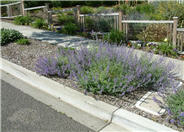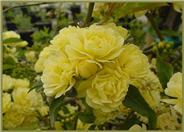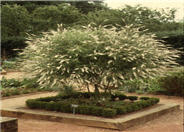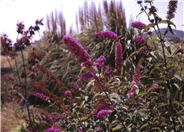
Common name:Catmint
Botanical name:Nepeta X faassenii
Nepeta faassenii makes soft, grey-green, undulating mounds to 1.5' high in bloom, spreading 3'-4' wide. The small leaves are attractive to cats. This perennial has lavender blue flowers in summer. Catmint can be planted in sun or shade and needs medium amount of water. Prune spent flowers to encourage more blooms.

Common name:Hybrid Tea Rose (selections)
Botanical name:Rosa Hybrid Tea varieties
These shrubs and vines are the most loved in the Western USA and are very resilient. They come in a wide variety of sizes and colors and are easy to maintain with proper care. They can be used in a water-conserving garden with careful attention to irrigation practices.

Common name:Yellow Lady Banks' Rose
Botanical name:Rosa banksiae 'Lutea'
This semi-evergreen rose can climb to 20'-30' and has double, non-scented yellow flowers.

Common name:Chaste Tree
Botanical name:Vitex agnus-castus
The Chaste Tree is a deciduous tree or small shrub in which the sizes vary due to their location, but they tend to be multi-trunked and widespreading. It blooms in the summer with 7" blue flower spikes and the leaflets are green above and gray beneath. The Chaste Tree is a native to California and is drought tolerant. -Cornflower Farms

Common name:Butterfly Bush, Summer-Lilac
Botanical name:Buddleja davidii
Butterfly bush is a fast growing deciduous or semi-evergreen shrub ranging from 3' up to 10', with an open, rangy growth habit. It should be cut back nearly to the ground in fall for size control and appearance. Purple, pink, white or red flowers appear in spring and summer, attracting butterflies. This shrub looks great in mass plantings.
| Designer: Descanso Gardens | DG Path Through Descanso Gardens |
Photographer: GardenSoft |
Soils and Compost:
Incorporate compost 6" into your soil to retain water, reduce compaction, feed earthworms, and provide valuable nutrients to your plants.
Water Saving Tip:
Apply a layer of mulch around plants to reduce moisture loss.
Choose organic mulches, such as shredded bark, compost or aged sawdust.
Integrated Pest Management:
Drip and other smart irrigation delivers water directly to roots, allowing no excess water for weeds.
